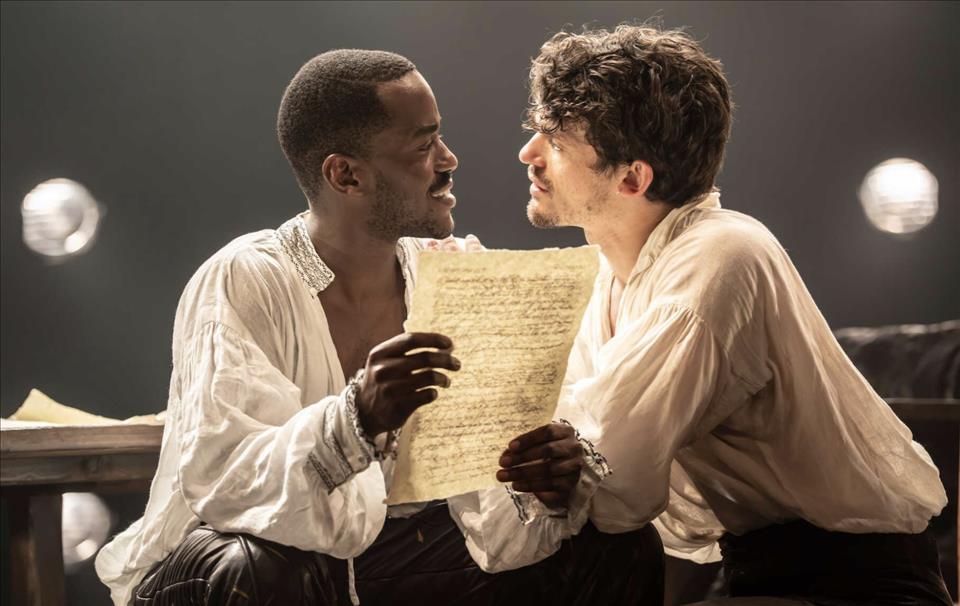
Born With Teeth: Queer Imagining Of Shakespeare And Marlowe Tale Is Also A Play About Plays
Starring Edward Bluemel as the Bard and Ncuti Gatwa as his contemporary Christopher“Kit” Marlowe, Adams' play imagines the process of the two co-authoring Henry VI Parts 1, 2 and 3 – which historically have always been attributed solely to Shakespeare .
As the programme note makes clear, linguistic analysis points to Marlowe very likely having contributed to these plays – though of course, there is no hard evidence for the conversations that take place in Adams' Elizabethan writers' room.
This imagined collaboration is more than professional, as the sultry poster for the play reveals. While Marlowe is widely thought to have been gay , Born With Teeth builds on the knowledge that Shakespeare was probably interested in both female and male affections. The play contributes to a long line of queer Shakespeare work, including most recently Will Todd's history , Straight Acting: The Many Queer Lives of William Shakespeare.
Bluemel and Gatwa display a magnetic chemistry and engaging physical presence on stage. The two young actors lead the audience through a rollercoaster of emotion, prompting them to root for the pair to kiss, fight, shake hands and ultimately write a classic trilogy of plays.
By creating this possible past, the imagined sensual co-writing of the Henry VI plays contributes to a queer retelling of history. Queer lives and experiences have traditionally been subject to erasure by historians; imagined pasts are a way of answering this homophobic practice.
My research looks at how imagined narratives provide a way of understanding queer experience and questioning what is“normal”. To queer something in an academic sense means to question any notions of dominance, legitimacy and normality in society. By foregrounding the homoerotic aspects of Shakespeare and Marlowe's lives, Born With Teeth challenges presumptions of a dominant version of history.
Alongside exploring queer lives, the process of collaborative writing, and the tense religious environment of Elizabethan England, Adams' play is also about plays themselves. This is an example of“meta-theatricality” – an artistic device of calling attention to the performative nature of a production. Born with Teeth does a clever job of employing meta-theatricality in three ways.
The first instance occurs as Will and Kit discuss their approach to writing the history of King Henry VI. Will is keen to rely heavily on a historic account provided by English chronicler Rafael Holinshed. Marlowe, on the other hand, doesn't want the truth to get in the way of a good story. Of course, what a historian writes is always a version of the truth (at best), but this early disagreement between the two wordsmiths cleverly functions as almost a prologue to the play.
Born With Teeth is an intense two-hander between two very different characters. Johan Persson / RSC
Will and Kit's dialogue about writing Henry VI tells the audience the play will not necessarily be providing an accurate history of events – that while this is a play about the past informed by historical accounts, it is nevertheless a piece of theatre whose function is to entertain and invite contemplation.
So any Shakespeare enthusiast ready to call into question the veracity of the play's events is immediately put right by the very meta-theatricality of Will and Kit's conversation.
A second example occurs as the arrogant Kit, disdainful of his lesser-known contemporary throughout, begins to acknowledge Will's artistic talent. In particular, Kit finds it quite powerful that Will has a way of endearing his villains to the audience.
An exuberant Gatwa plays Marlowe with relish. Johan Persson / RSC
In many ways, this is exactly what is happening within Born With Teeth. Kit is obnoxious, lecherous, threatening and petulant. And yet, his pride becomes him. His flaws are winsome and undeniably charming. In the same way that Kit commends Will's ability to craft a lovable baddie, he himself achieves by enchanting the audience.
The third and most subtle bit of meta-theatricality – attributable to both Adams and director, Daniel Evans – is the way the characters play to the crowd. During one of their many intellectual sparring matches, Kit critiques Will's comedic pandering to the pleasures of the pit – the part of the theatre inhabited by“groundlings”, who paid the least to stand and watch the play. Again, this is an instance of Born With Teeth commenting on theatrical practice while employing it.
The play regularly makes Shakespearean references and in-jokes which garner knowing laughter from the audience. For example, when Will comes up with lines that end up in other Shakespeare plays, or mentions how Kit will inspire his King of Cats (Tybalt in Romeo and Juliet), the audience reaction demonstrates their understanding and appreciation of these in-the-know jokes.
One of the biggest laughs comes from dramatic irony, where the audience is aware of something that the characters are not. Kit analyses and critiques some of Will's scenes, to which the Bard replies:“It's not like people are studying my writing.”
Of course, the joke is that Shakespeare is indeed one of the most studied and appreciated writers of all time. And so the wink-wink, pandering humour that the play comments on, it also enacts. With its clever exploration of theatrical collaboration and queer desire, there is much to enjoy here. See Born With Teeth if you can.
Born with Teeth plays at the Wyndham Theatre until November 1.
Looking for something good? Cut through the noise with a carefully curated selection of the latest releases, live events and exhibitions, straight to your inbox every fortnight, on Fridays. Sign up here .

Legal Disclaimer:
MENAFN provides the
information “as is” without warranty of any kind. We do not accept
any responsibility or liability for the accuracy, content, images,
videos, licenses, completeness, legality, or reliability of the information
contained in this article. If you have any complaints or copyright
issues related to this article, kindly contact the provider above.


















Comments
No comment